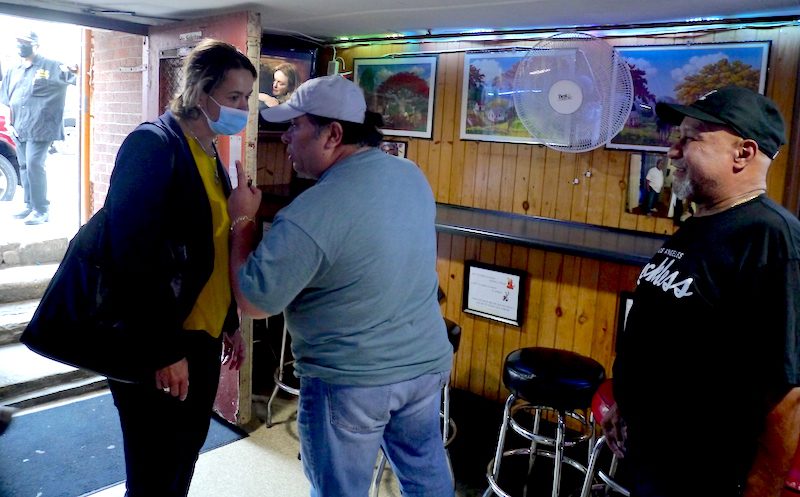Candidates appeal to Latino voters
Community’s electoral power seen growing

With just about a month before election day, the two candidates in Boston’s mayoral race are looking to make connections in the Latino community — bringing in endorsements from Latino elected officials and attempting to engage voters in majority-Latino neighborhoods.
Making up just over 15% of the city’s electorate, Latino voters could be a major influence in deciding who sits in the mayor’s office next. At the same time, low voter turnout and diverse political leanings across the community could prove a challenge to campaigns in coming weeks.
“Their participation rates have been going up in the midterms and the general election … The problem is that this particular election is an off year,” said Luis Jiménez, an associate professor of political science at UMass Boston and researcher on Latino voting habits across the Bay State.
Informed by low turnout in the preliminary election, Jiménez said that without presidential or state candidates, it may be hard to get voters excited enough to come out and cast their ballots. However, he said, successfully engaging Latino voters — or any voting bloc — could sway November’s outcome if the turnout remains low.
“I think Latinos have the potential to have a huge impact, because of very low participation. I mean, I expect that anything can make the difference, really, when you have such few votes,” Jimenez said.
Both candidates, Michelle Wu and Annissa Essaibi George, have made attempts to appeal to Latino voters over the last week — both traveling to East Boston, home to more than 50% of the city’s Latino population.
On Sept. 29, Essaibi George hosted a roundtable discussion at the Veronica Robles Cultural Center, during which advocates from the Latino community were invited to ask questions of the current city councilor at-large as part of her “Listen & Learn Tour.” In a press release, the Essaibi George team states the tour is “a series of events and conversations that will inform her official Equity, Inclusion and Justice Agenda.”
In attendance were Regla González of the League of United Latin American Citizens, Felicia Teruel, a single mother from Dorchester, and Alberto Vasallo, president and CEO of El Mundo Boston.
The prevailing issue discussed at the roundtable was education, and all three asked the mayoral candidate to consider measures for equitable access to education on all levels, especially as it pertains to parent involvement. Teruel asked that Essaibi George look into increasing after-school programming for Latino students as well as making resources available for parents needing help with their children’s problems.
“I’m a single mom. I also work. And that’s why I brought up the points about recreation and children, because that’s something that I do on a daily basis. There’s no programs for the kids. There’s not enough programs for kids or parents,” she said afterwards.
Eldin Villafañe, a political communications consultant at the Boston based firm Barrales Public Affairs, said some of the other key issues for many Latino voters include affordable housing, small business protections and protection for immigrants, as well as a dismantling of language barriers.
“So the challenge to the mayoral candidates is to speak to those issues. The Latino community, it’ll energize them,” Villafañe said.
On the issues, the candidates’ messages to voters contain common themes — both are daughters of immigrants with ideas to address education and housing and promote small business growth, bringing many to believe that swaying Latino voters will ultimately come down to interpersonal connections each side is able to make. While Wu has taken more progressive stands — supporting rent control and reforms to the police department — Essaibi George has more moderate positions on the issues. But voter contact could play a bigger role than the candidates’ stands, says Prof. Jiménez.
“People coming in and talking to you directly and asking you to vote is going to have more of an impact than you looking at the two candidates and thinking, oh, this person is better or that person is,” Jiménez said.
Villafañe echoed the sentiment, saying that in the end, both candidates have the challenge of engaging with the community on a daily basis, reminding them “those issues are going to be a priority for them when they become mayor.”
But he said the issues will play a role in how many Latinos vote.
“As part of the coalition of Black and brown voters … the Latino community is a critical part,” he said. “The Latino community, it’s not a monolithic community, just like any other community.”
For Essaibi George, support may come from residents like Regla González, who after the roundtable remarked on Essaibi George’s ‘warm’ nature, saying “She is a very open person, and I feel comfortable talking and asking her things.”
Support for Wu
Just prior to the roundtable, Wu’s campaign was welcoming support from Laborers’ Local 22 during which she addressed the crowd in Spanish.
“She’s able to communicate with [voters] in Spanish. Not that it is necessary, because honestly, if you want to connect, you just have to be sensitive enough,” said Josiane Martinez, a political consultant helping the Wu campaign.
Martinez said her support for Wu began back when she worked at the political engagement group ¿Oíste?
“She earned the hearts and the minds of the Latinos because she immediately understood how important they are for Boston,” she said.
Martinez is just one politically-connected endorsement for the Wu camp. Last week, Councilor Ricardo Arroyo and his father Felix joined Rep. Liz Miranda as well as the “100+ Latino leaders in “Estamos con Wu.”
As election day approaches, both candidates say they plan on continuing to get out the vote. At the time of publication, both candidates will have participated in the Amplify Latinx mayoral forum, and in the coming weeks a coalition of Black and Latinx leaders led by Boston state Rep. Russell Holmes looks to hold forums on issues central to voters of color.






